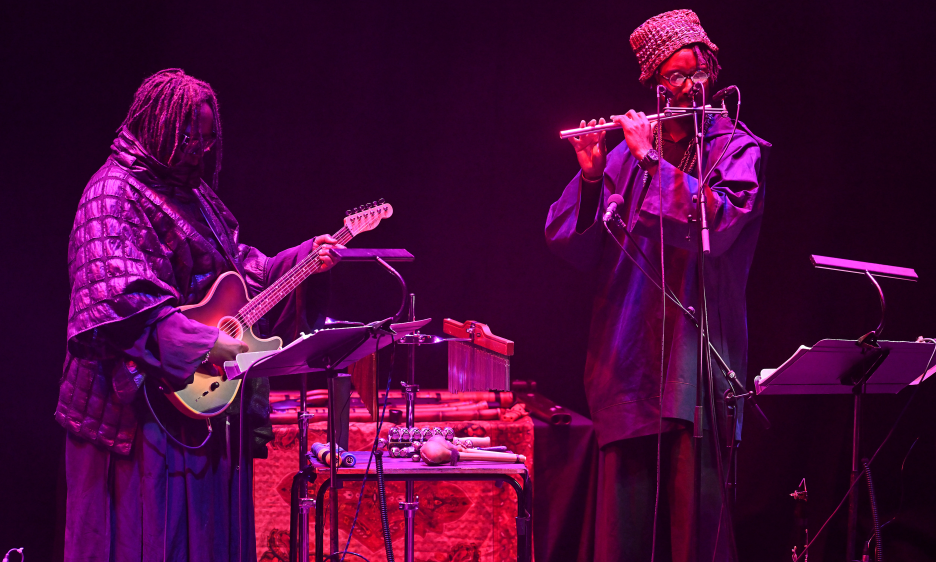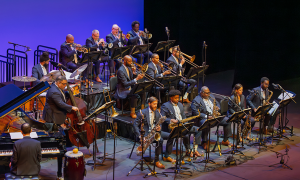Home » Jazz Articles » Live Review » Shabaka Hutchings At Barbican Hall
Shabaka Hutchings At Barbican Hall

Courtesy Mark Allan
Barbican Hall
Perceive Its Beauty, Acknowledge Its Grace
London
May 9, 2024
Ch-ch-ch-ch-changes ...
London's Shabaka Hutchings has become best known for his incendiary open-the-gates work on tenor saxophone with Sons of Kemet, The Comet Is Coming and the South African-based Shabaka & the Ancestors . But his April 2024 album, Perceive Its Beauty, Acknowledge Its Grace (Impulse!), performed for the first time at the Barbican, marks the start of a dramatically subdued stage in his music making. The trigger for the new approach came during the pandemic when, confined to quarters, Hutchings fell in love with the Japanese shakuhachi flute, the quietly spoken instrument which first edged itself into jazz with Hōzan Yamamoto's performances on Tony Scott's oxymoronically titled Music For Zen Meditation (Verve, 1964). Hutchings spent the best part of two years learning to play it, and, while he plays other flutes and clarinet on the new album, the shakuhachi is its emblem. Shortly after completing the album, Hutchings announced that he would no longer be playing the saxophone, but flutes, instead.
It has become customary, when critiquing a musician's change of direction, to say that what is being heard is not a revolution but an evolution. Often this is true. But sometimes it is b.s. attempting to camouflage confusion. The benchmark occasion came in the mid 1960s when John Coltrane followed The John Coltrane Quartet Plays (Impulse!), released August 1965, with Ascension (Impulse!), released February 1966. Most critics did not know what to make of Ascension but, obviously, were not going to admit as much. Some, grasping at small sonic straws from the early 1960s, maintained it was an incremental development in Coltrane's music. Others simply assumed Coltrane had gone mad. Only a few heard Ascension for what it was: a revolutionary clarion cry marking a new beginning.
So it is with Hutchings' first post-pandemic album. It is not signalling incremental change, it is a step change, and a mighty deep one at that, where space and pianissimo replace thunder and lightning, and the textural subtleties of shakuhachi, bamboo and quena flutes, svirel and clarinet—not the bass clarinet of Hutchings' Sons Of Kemet days, but the standard B-flat instrument—replace ferocious tenor saxophone. (Check the YouTube below.) It works well on record, where it can be listened to in a focused private space. And as the Barbican performance showed, it can work even better live in concert in a large auditorium among around 1,900 other people. As another visionary player, New York's tenor saxophone Jedi, Oded Tzur, maintains, given the right circumstances, music is humankind's best method of collective meditation.
Hutchings' band at the Barbican was, with two exceptions, different from that heard on the album, most of which was recorded at the Van Gelder Studios in New Jersey. One exception was electric guitarist Dave Okumu, who is heard on one track of the album and came onstage for the last three pieces. The other was the singer Eska Mtungwazi, who joined the band for the final piece, "Song Of The Motherland," which also closes the album. There were two harpists, Miriam Adefris and Alina Bzhezhinska, who was first seen on the Barbican stage in 2017 at the historic Concert For Alice And John headlined by Pharoah Sanders, and whose Altera Vita (BBE, 2024), made with saxophonist Tony Kofi, is highly recommended. The singular Elliot Galvin played piano, and Hinako Omori played electric keyboards and synth. (Nubya Garcia, who has illuminated the Barbican stage several times, was digging things a few rows in front, but was there strictly to spectate.)
The set list was drawn from the album, in pretty much the same order, with the exception of the penultimate piece, "Black Meditation," which does not appear on the album. "Black Meditation" was also exceptional in that it differed from the remainder of the programme by building to a rolling, crashing Rite Of Spring-like maelstrom of sound—raw guitar, Hutchings going wild and shamanistic with percussion in one hand and flute in the other, and the twin harpists vigorously attacking the strings with four hands. Then stir in keyboards. It says something good about Hutchings' cosmology that "Black Meditation" was performed by a band comprising three black Britons, of Caribbean and African heritages, a white Briton, a Japanese, a Ukrainian and an Austrian-Ethiopian, four of them women, three of them men. (A few days earlier, in London's mayoral election, 20,519 people had voted for the white nationalist Britain First party, but 1,088,225 had voted for the victorious Labour candidate, Sadiq Khan, whose campaign slogan was "Hope Not Hate.")
Anyway, "Black Meditation" demonstrates that Hutchings has not completely withdrawn from high-decibel high-impact music making. We had best stay tuned... and assume nothing.
Tags
Live Review
shabaka hutchings
Chris May
United Kingdom
London
Sons of Kemet
The Comet Is Coming
Shabaka & the Ancestors
Tony Scott
John Coltrane
Oded Tzur
Dave Okumu
Alina Bzhezhinska
Pharoah Sanders
Tony Kofi
Elliot Galvin
Nubya Garcia
PREVIOUS / NEXT
Shabaka Hutchings Concerts
Support All About Jazz
 All About Jazz has been a pillar of jazz since 1995, championing it as an art form and, more importantly, supporting the musicians who make it. Our enduring commitment has made "AAJ" one of the most culturally important websites of its kind, read by hundreds of thousands of fans, musicians and industry figures every month.
All About Jazz has been a pillar of jazz since 1995, championing it as an art form and, more importantly, supporting the musicians who make it. Our enduring commitment has made "AAJ" one of the most culturally important websites of its kind, read by hundreds of thousands of fans, musicians and industry figures every month.


























